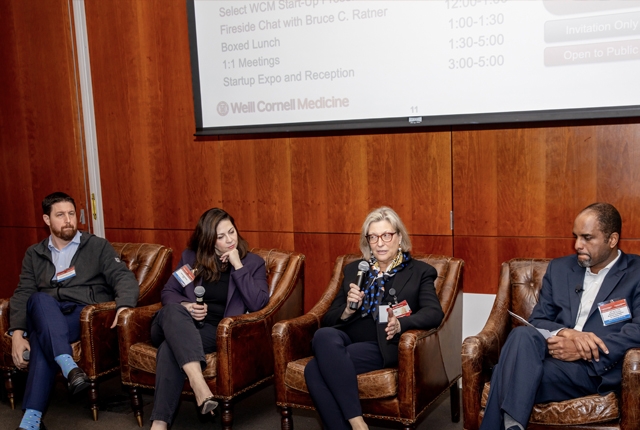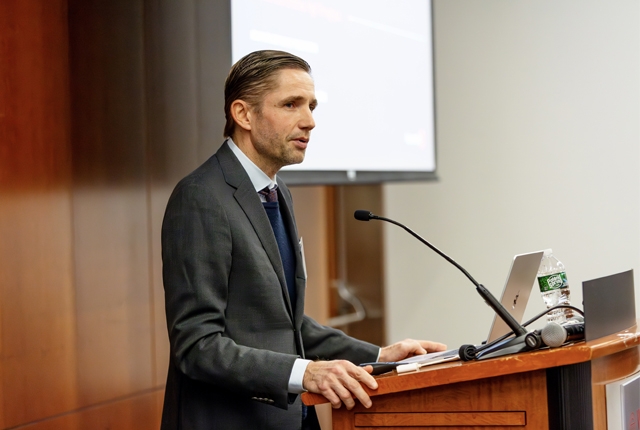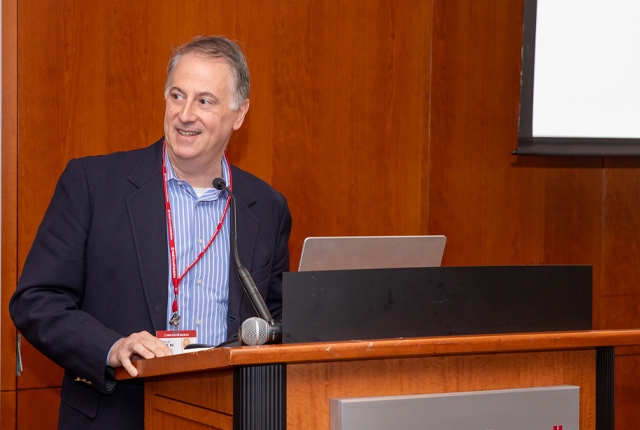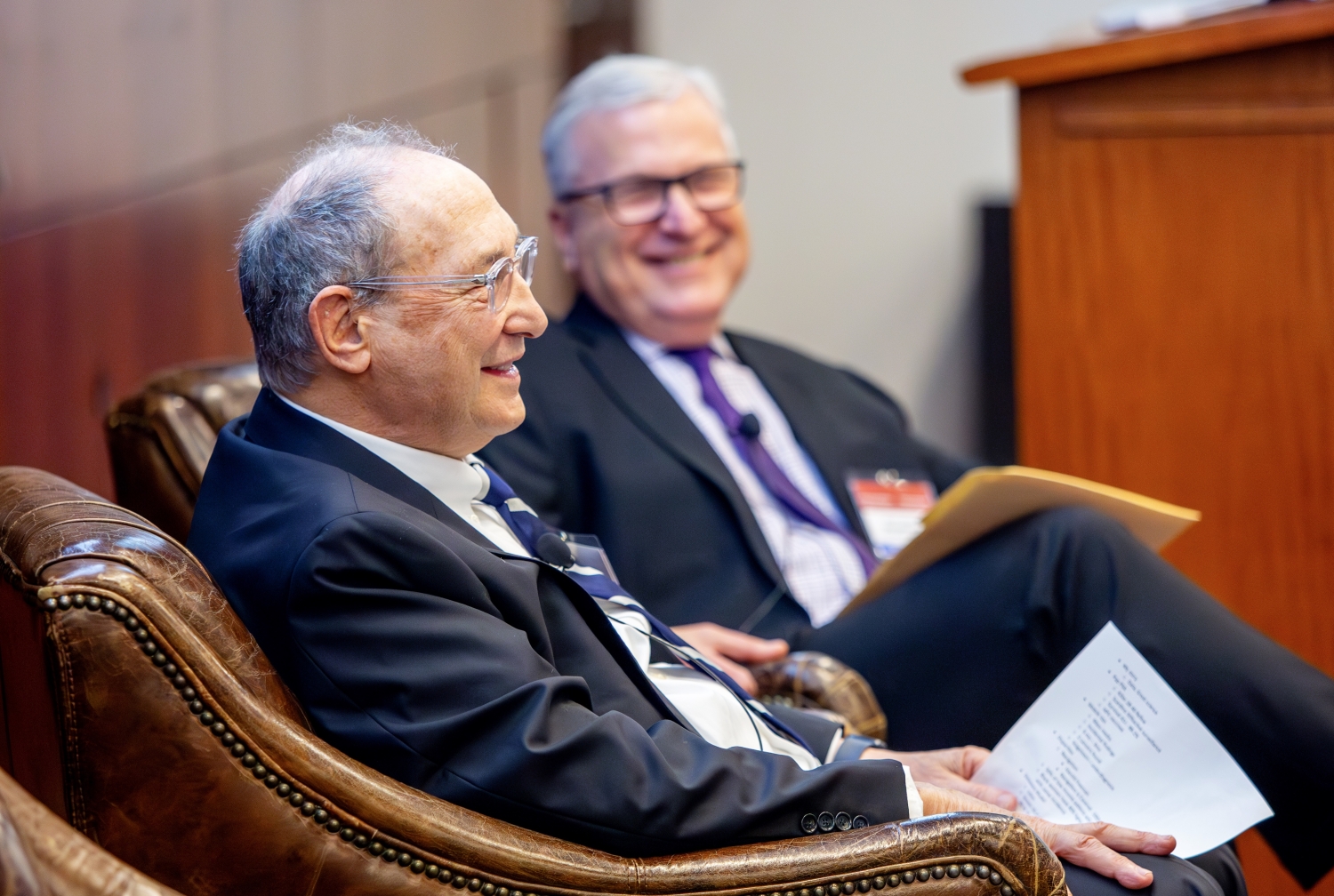Bruce Ratner, a familiar figure in the New York scene, is known for his work as a major property developer, including helping revive downtown Brooklyn’s economy, and as a former commissioner of consumer affairs. What most people don’t know is he is a strident advocate for the advancement of innovative cancer diagnostics.
At the 2024 Startup Symposium & InvestConnect Conference, held Feb. 28 at Weill Cornell Medicine’s Belfer Research Building, Ratner, now a co-author of a new book, “Early Detection: Catching Cancer When It's Curable,” discussed the clear benefits of early cancer detection technologies.
The conference, hosted by the BioVenture eLab, a part of Weill Cornell Medicine Enterprise Innovation, celebrated scientific inquiry and the entrepreneurial spirit. Attendees included startups founded on Weill Cornell Medicine innovations, investors, researchers and industry experts.
“Our mission is simple and it's what we wake up every day to do: to accelerate the best of biomedical innovation to market and translate the groundbreaking research here at Weill Cornell Medicine into revolutionary care through collaborations,” said Dr. Lisa Placanica, senior managing director, Center for Technology Licensing at Weill Cornell Medicine.
In his fireside chat with Dr. John P. Leonard, senior associate dean for innovation and initiatives, Ratner, who serves on Weill Cornell Medicine’s Board of Fellows and also sits on the boards of Memorial Sloan Kettering Cancer Center and the Cold Spring Harbor Laboratory, showed an attentive audience the dramatic differences between late-stage and early-stage cancer survival rates backed by data.
For example, late-stage survival rates for breast and prostate cancers are 29 percent and 31 percent, respectively. But early-stage survival rates are 99 percent. With colon cancer, the late-stage survival rate is 14 percent, while the early-stage survival rate is 91 percent.
"Take a careful look at what the data says with respect to late-stage cancer and see what happens if you catch it early," Ratner said. “If you don’t catch it early, you don’t live, and that’s unacceptable.”
Ratner’s passion for early cancer detection stemmed from his family experiences. He recounted his memories of his grandmother's battle with cancer when he was just 5 years old, remembering saying to himself, “I don’t have to worry about this—in 50 years, there won’t be such a thing as cancer.”
When he was 28 years old, his mother got colon cancer. “I went to Weill Cornell Medicine’s library, researched colon cancer and discovered that she had three or four years to live,” he said.
Cancer kept showing up in Ratner’s life, claiming the lives of his sister-in-law and brother, helping spark his pursuit of learning more about the disease.
Recalling his brother’s fight against metastatic brain cancer, Ratner highlighted how discussions with Dr. José Baselga, then chief medical officer at Memorial Sloan Kettering Cancer Center and known for his work in developing and testing targeted cancer treatments, helped make early detection his mission.
“Early detection of cancer, that’s what I want to dedicate myself to,” said Ratner, who founded the Michael D. Ratner Center for Early Detection of Cancer in memory of his brother to advance and expand the use of early detection technologies to defeat cancer.
“Through the center, Bruce is promoting early detection of lung cancer, particularly with a focus on low income and underserved populations where there's clearly a need,” said Dr. Leonard, who is also the Richard T. Silver Distinguished Professor of Hematology and Medical Oncology and interim chair of the Weill Department of Medicine at Weill Cornell Medicine.
Ratner represents the shift from business to science, while Weill Cornell Medicine alumnus Dr. Barry Kappel (Ph.D. ’06), founder, president and CEO of Sapience Therapeutics, exemplifies the move from science to business.

From left: Dr. Barry Kappel, Andrea Ashford-Hicks, Dr. Randi Silver and Dr. Jeff James (moderator).
Dr. Kappel sat with leading entrepreneurs Andrea Ashford-Hicks, CEO at Cayuga Biotech and Dr. Randi Silver, associate dean of Weill Cornell Graduate School of Medical Sciences and co-founder of Adiutrix Therapeutics, for a panel discussion. The panelists shared their experience and take on overcoming hurdles such as funding and manufacturing when they transfer academic research to a startup.
“When I started at Weill Cornell Medicine in 2001, my thought was to stay in academia and become a professor, and hoping to make a discovery that may one day lead to development of a drug,” Dr. Kappel said. His path changed when he learned he could attend the Samuel Curtis Johnson Graduate School of Management at Cornell’s Ithaca campus. “I realized that I can still continue my journey towards helping patients and developing drugs by funding or founding science-driven biotechnology companies.”
Dr. Kappel's journey highlighted the potential for academic discoveries that translate into patient care advancements, a primary takeaway from the conference.
The conference also showcased two Weill Cornell Medicine startups. Re-EmergeDBS, led by Dr. Nicholas Schiff (M.D. ’92), the Jerold B. Katz Professor of Neurology and Neuroscience at Weill Cornell Medicine, uses deep brain stimulation technology to improve cognition for patients who suffered moderate to severe traumatic brain injuries.

Dr. Bernard Peperstraete
Dr. Bernard Peperstraete, who co-founded Acuamark Diagnostics with Dr. Francis Barany, professor of microbiology and immunology, introduced a diagnostic assay the company developed to detect early-stage colorectal cancer. The assay, designed as a simple blood test, incorporates machine learning to look at methylation levels to detect cancer markers at the disease’s earliest stages. Its ease of use has the potential to make it accessible in a primary care setting and offers a strategy to achieve Ratner’s goal.
“Startups at every stage are the lifeblood of innovation in medicine,” said Loren Busby, director of the BioVenture eLab. “This is why we honor forward-thinking startup founders who are innovating and breaking new ground.”
Busby presented The Susan and Gene D. Resnick ‘70, MD ‘74 Prize for Excellence in Entrepreneurship to Abstractive Health, a physician’s AI system that streamlines clinical documentation. The prize, which helps foster intercampus collaboration and innovation, comes with a $10,000 award to help spur projects into action.

Dr. Nicholas Schiff
Following one-on-one investor meetings, the conference concluded with a Startup Expo and Reception, where attendees could view posters and tech displays and network.
While the focus of the event was to spotlight groundbreaking research at the intersection of business and science, it also explored areas in the U.S. health care system that need improvement.
Throughout his discussion, Ratner referenced data to make the case for increased investment in early detection technologies. He drew attention to the National Cancer Institute's 2023 budget, pointing out that only $600 million, or 9 percent of its $7.3 billion budget, was allocated for prevention and early detection.
“There’s a huge opportunity in early detection, but we don’t have enough people doing it,” Ratner said.
Many Weill Cornell Medicine physicians and scientists maintain relationships and collaborate with external organizations to foster scientific innovation and provide expert guidance. The institution makes these disclosures public to ensure transparency. For this information, see profiles for Dr. Francis Barany, Dr. Nicholas Schiff and Dr. Randi Silver.

